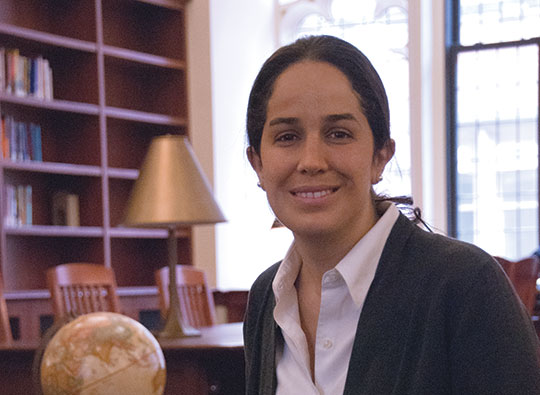Seeing How Others Live
In projects in impoverished areas of Mexico and Costa Rica, Katy De La Garza has learned as much as she's taught
In projects in impoverished areas of Mexico and Costa Rica, Katy De La Garza has learned as much as she’s taught
By Joe Levine
The summer after college, Katy De La Garza considered a banking career “for about a second” before heading for China, where she taught as a volunteer.
“People were materially poor but spiritually rich,” recalls De La Garza, 35, now a TC doctoral student in comparative and international education. “I got sick a lot, but the kids were amazing. One of them asked me, ‘Who’s Jesus?’ It really brought home that half the world doesn’t live like you do.”
De La Garza has applied that perspective ever since, working in some of the poorest rural areas of Mexico and her home country, Costa Rica. She has approached each assignment with humility and even wonder toward the local culture.
In 2002, right after graduating from Columbia’s School of International and Public Affairs, De La Garza helped launch a microfinance project in central Mexico that disbursed small loans and provided training to groups of local women.
“There was so much domestic violence there,” she recalls. “There was one woman with ten children who was abused by her husband. But whenever you saw her, she was always smiling, and she walked with such strength. She used her loan to start a cooking business, and the work made her happy. It made me see there are so many ways of turning your life around.”
De La Garza credits her parents for teaching her to respect others. Her father, who was born in Mexico, ran away to the United States at age 13.
“He went back to finish primary school in his sixties, but he was a self-made man who believed in helping others,”
she says. “He used to say, learn to eat caviar and learn to eat black beans, but especially enjoy the beans, because that’s what life gives you most of the time.”
De La Garza came to TC after managing the Nature Conservancy in Costa Rica. “Everyone talks about leaving a better planet for our children, but I realized we need to leave better children for our planet. That is where education is key!”
At TC, De La Garza is researching education and gender relations in rural areas. This summer, she’ll observe a bilingual education project in Guatemala that’s trying to combat illiteracy among indigenous children. It’s clear she’s absorbed as a researcher, but you get the feeling she’d be going anyway.
“In rural places, you see people without so many masks,” she says. “They remind you not to sweat the small stuff.”
Published Friday, May. 20, 2011
